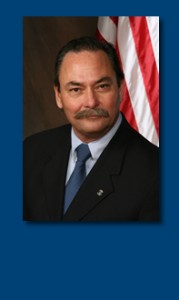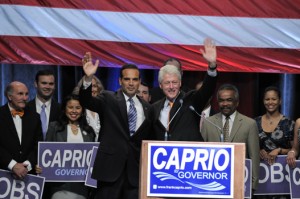Brian Chidester and Shaun Joseph assess progressive strategy in Rhode Island.
As summer slouches into fall in these United States, most of the nation is wondering whether, come November, it will be thrown under the control of claque of racist wackadoos. Excitement! And indeed, the kind of organic excitement that you can’t get at the movies, because it can’t be reproduced in explosions or even IMAX 3D.
Still, as mentally stimulating as the prospect of Tea Party America is, it is at the same time the cause of some anxiety. From this angle, the politics of Rhode Island must seem like a refreshing oasis; its GOP is vile, no doubt, but also so superlatively disorganized that it is sure to capture not a single statewide office, and a mere handful of seats in the General Assembly. (You may need more than two hands to count them, but certainly not all your digits. Male readers can keep their shoes on in any event.) Sunk well in the deep blue “D,” Rhode Island is thus delivered in advance from the depredations of teabag rule—right?
Slow down.
Rhode Island is probably the most Democratic-dominated state in the union, but most progressives would add that many of its Democrats are DINOs, or “Democrats In Name Only.” These DINOs, in the popular left-liberal imagination, “ruin everything” through their insidious control of the Democratic Party. In a previous article, we pointed out that this mythology or demonology doesn’t really hold up to critical analysis at the national level. That said, the pestilence of very rightist Democrats—such as Frank Caprio, Doug Gablinske, or Peter Palumbo—is a real phenomenon in RI politics.
The existence of such political figures in the Democratic Party is not actually interesting in itself; it is, in fact, exactly what one should expect. The term DINO is something of a misnomer—or more precisely, every Democratic is a DINO, because to be a Democrat at all is to be one “in name only.” The Democrats objectively don’t stand for anything, nor have they since at least the end of Reconstruction (before which one could argue that they had a principled commitment to oppressing Black people). There is an official Platform, but Democrats view their Platform as Roman Catholics view their Bible: a remote text about which one has no concrete knowledge. The “principles” of the Party, whenever someone dares to articulate them, are unobjectionable vague talking-points or mere mellifluous nouns: security, opportunity, and diversity; patriotism, hard work, and honesty; sunshine, lollipops, and rainbows; or suchlike.
The Democrats do, of course, have a more liberal center of gravity than the GOP. But in a state like Rhode Island, where the Democrats have captured the entire political apparatus, it’s natural that most rightist politicians—who are “organically” Republicans but even more organically opportunists—would gravitate to the Democratic Party. In this sense the efforts of groups like Progressive Democrats of America (PDA) are profoundly self-defeating, since their fundamental support for the state’s ruling party helps reproduce the monopoly conditions that attract their hated “DINOs” in the first place.
In 2010, then, the interesting thing isn’t the DINOs, but the reaction to them amongst the “progressive Democrats,” used here in the broad sense to include not just PDA and MoveOn, but the entire left-liberal complex, up to (and especially) the leadership of the trade unions. In this essay we’ll argue that the progressive Democrats have made (or been compelled to make) a kind of break with the Democratic Party mainstream as a result of the latter’s support for the DINOs. However, this “break” is not a consistent, programmatic break: it is completely empirical and very badly (if at all) thought through. The result, we contend, will be a serious fiasco for the progressives, one that will leave them with even less influence in the short term and no strategy in the long term. The only winning approach would involve a consistent left-wing exit from the Democratic Party.
Our tragicomedy will proceed in three acts.
ACT I: Doug Gablinske vs. “the pigs at the trough”
By any measure, State Representative Doug Gablinske (District 68) is right up there with Don Carcieri and Deb Gist as an enemy of public education and unions. It’s for precisely that reason that Gablinske has sat on the House Committee on Labor and has chaired the Subcommittee on Education. Gablinske has been vocal in his opposition to “union control” of the General Assembly, and has taken every opportunity to align himself with big business and the right wing. Most notoriously, during hearings on public employee pension “reform” last fall, Gablinske called teachers “pigs at the public trough” for having decent, state-(under)funded pensions. (Gablinske’s wife is an elementary school vice-principal and former teacher in Warren; hence Gablinske, charmingly, called his own wife a pig.) After only four years in the General Assembly, he has forged strong ties with the Rhode Island elite as their willing and enthusiastic tool—in fact, his candidacy is supported by the Rhode Island Coalition, a right-wing, pro-business, anti-immigrant group. A Gablinske defeat would be a fine thing indeed.
Another sign of his career ambitions—though he claims “altruism”—was his vote in favor of Commissioner Gist’s Fair Funding Formula, a big step in Rhode Island’s Race to the Top application. While it’s scandalous that Rhode Island went 15 years without any formula for deciding how the state would fund local school districts, the Gist formula redivided the already-allocated state education budget such that most districts got modest increases while some districts—including Central Falls, Warwick, and Gablinske’s own Bristol-Warren—got whacked.
The formula is in reality all about property tax relief, which was the biggest factor in the reallocation. It’s all the more odious because of the Paiva-Weed Bill, which severely limits how much local districts can increase their property-tax revenues and thus their education contributions. As Bristol-Warren School Committee Chair Paul Silva noted, even if both towns increased their tax levies by the maximum amount, and the Joint Finance Committee approved the greatest possible increases in funding, the school district still has no hope of recouping the almost $10 million over ten years that the formula cuts from the district.
For these reasons, the WorkingRI coalition and the National Education Association of Rhode Island (NEARI) have both been keen to unseat Gablinske. Enter Richard Morrison, a local lawyer with an autistic child who got no help from his representative in navigating the educational bureaucracy. Morrison seems like a decent guy, but he’s clearly a political neophyte; the significance of his campaign is that he’s the ABG: Anybody But Gablinske. The real war is between labor (especially the NEA) and Gablinske—and Gablinske knows it.
Morrison has one campaign sign, declaring that “He’ll put Bristol/Warren First.” The district was regionalized only 17 years ago—and so to anyone over 35, unless they have kids in the schools, this slogan is relatively meaningless. His campaign literature states that he would not have voted for a $9 million cut to local schools—but without addressing the bigger questions involved in the RTTT application and the Fair Funding Formula, this is a mere negative slogan.
In contrast, Gablinske has clearly defined himself as an enemy of unions and a proponent of destroying teachers’ pensions. Not only this, but he has framed the issues such that the teachers and our union are portrayed as the enemy of the tax-paying voters, the “pigs at the trough” who will be harshly disciplined by Gablinske in his third term. The September 8 issues of the Warren Times-Gazette and Bristol Phoenix carry the front-page headline: “Gablinske takes aim at union’s ‘egregious’ behavior.” The Warren rag includes three Gablinske ads, including one in which he received the endorsement of Warren Democrats Jan Malik and Walter Felag, plus a campaign sticker on the front of the paper.
A previous edition of the local papers included a Gablinske ad featuring Gist, both giving a thumbs up. While this may not be tantamount to an endorsement, it is nonetheless a sign of Gablinske’s orientation—and that he understands that he and Gist both stand on the anti-union side, a fact that both the teachers’ unions (but especially the AFT) seem to have missed.
But the real problem with the Morrison campaign—and with the union strategy behind it—is that in contrast to Gablinske’s sharp anti-teacher, anti-union attack, our side has no real program on pensions and funding. At the state level, NEARI’s position boils down to “preserve teacher and state worker pensions as they are”. With pensions essentially abolished for the private sector—at best replaced by 401(k) plans, at worst replaced by nothing—such a demand is a narrow, sectional, and will not gain traction with the broad public. Raising demands like “state-funded pensions for all” and “no retiree should be poor” would actually provide a serious counterpoint to Gablinske’s attack—but it seems to require more imagination than is currently on loan to the union movement.
The issue of the Fair Funding Formula is even more tricky: in Morrison’s local campaign literature, the issue is simply stated as “he wouldn’t cut money from local schools”. Does this mean he’s against a fair funding formula in principle? For unfair funding and arbitrary allocations? In an email to BWEA members, NEARI President Larry Purtill wrote: “Yes, Rhode Island needed a funding formula, but one that is fair to every district and every child attending our public schools.” This assertion lacks substance. The demand should be: Fairly fund all Rhode Island schools by increasing overall education expenditure. No district should have to suffer for the State’s past failures to adequately fund education!
Instead, we see a local campaign against a DINO that features an inexperienced and unknown candidate, lacking well-articulated principles, to counter a vicious opponent of the labor movement.
ACT II: “We wuz tricked!”
The most sympathetic pick of the progressive Democrats—the endorsement that best approximates what they might do if they had a coherent strategy—is David Segal for US Congress (District 1). This seat came free with the surprise resignation of Patrick Kennedy, who seems to be suffering from a serious case of “tired blood,” even by Kennedy standards. The death of his father, the undeservedly iconic Ted, deprived li’l Patty of his political career’s raison d’être, that is, making Ted think his son is not a loser.
Kennedy’s resignation provoked a Democratic scramble for his now-open seat, featuring contenders more or less curious to behold. Not at all curious is Providence Mayor David Cicilline, whose drive to climb the greasy pole to Washington has never been in question. The Democrats’ chief cheese-squeezer, Bill Lynch, decided to test whether money-changers were still welcome in the temple; and Anthony Gemma, some kind of plumbing magnate, is running on the the fresh idea of stimulating businesses (like his) with tax cuts (for him).
Segal cuts the most attractive figure in this bunch simply by having nothing obviously wrong with him (and by being, well, the most attractive). But to his credit, Segal has a decent progressive record, albeit more impressively so during his years as a Green in the City Council. Unlike Morrison (see above) or Chafee (see below), he’s not a political zero with no ideas (setting aside his amusing assertion that he’s “almost non-ideological”).
Still, Segal’s bid for the nomination is somewhat odd. An indifferent speaker drawn, by his own admission, to the technocratic side of legislation, Segal has always needed to ally with stronger political figures. In the City Council, Segal was attached to the combative Miguel Luna, both of whom could count on the broader Council’s brooding (albeit correct) distrust of the Mayor. Segal’s accession to the State House was guaranteed by Paul Moura, who “gave” Segal his seat on the way up to the State Senate. In the House, Segal has tried to integrate himself into a Progressive Caucus, but this Caucus has been rendered largely imaginary by the vacuity of the state’s Democratic politics, compounded by the hilarious personal scandals of the erstwhile Caucus “leaders.”
Segal’s lack of independent political bearings were revealed by a particularly serious mistake he made in the last legislative session: his vote for the now-infamous state income tax restructuring, which slashed the top marginal rate from 9.9% to just under 6%. By a phony argument, the Carcieri administration held that the restructuring would be “revenue neutral.” In August, well after the restructuring passed unanimously in both chambers, the administration—under pressure from the Poverty Institute—released new numbers showing that lowering the tax rate for the rich would (surprise!) actually cause them to pay less taxes. The 30 richest taxpayers are to share some $560,000 in tax breaks, and the “revenue neutral” measure is expected to cost the state $5-10 million in revenues for tax year 2010.
The Providence Journal reported these findings on August 25, drawing the next day from Segal that classic cri de coeur: We wuz tricked! (“I am furious that the tax policy writers gave members false data when the legislation came before us…. If presented with accurate data at the time of the vote, I absolutely would have opposed the tax change, and aggressively urged my colleagues to join me.”) Segal deserves credit for admitting a mistake and trying, however uselessly, to correct it by demanding a legislative special session; this compares well to the aimless, brainless responses of other House Democrats, including Speaker Gordon Fox and Finance Committee Chair Steven Costantino.
Yet there was no reason for Segal to vote wrongly in the first place. Anything from the budget shop of Carcieri/Gallogly should be disbelieved on principle. Furthermore, there were credible voices—including that of Pat Crowley, an NEA vice-president and Segal supporter—cautioning that the official estimates were based on shaky assumptions. Finally, a progressive with some vision would have rejected the whole framework, advocating instead a budget based on an expanded social/public sector funded by a sharply progressive income tax (ie, substituting public action for a listless or parasitic private sector). On this issue Segal’s self-presentation as a tough, independent progressive comes into conflict with his behavior in conditions where real moral and political courage were badly needed.
On top of all this, there is the fact that Segal is going to lose; Cicilline had the race sown up as soon as he entered it. One might argue that Segal’s presence helped bring progressive ideas into the mix—but then the best way to do that is through an independent or third-party run, which lasts longer and doesn’t require the loser to endorse some creep. The only “pragmatic” element of Segal’s run is the impressive amount of money he’s raised, which he’s raised pretty exclusively from “progressive Democrat” sources. That is to say, the progressive Democrats’ “proof” that one must stay in the Democratic Party winds up being…that they themselves give all their money to Democrats. QED.
But, at least, li’l Patty is free! We wish him a happy journey.
ACT III: The Missing Linc
Perhaps the most interesting race this season—it is, among other things, closely-fought and will not terminate with the Democratic primary on September 14—is the gubernatorial contest between Democrat Frank Caprio, currently the state’s Treasurer, and former US Sen. Lincoln Chafee, who is running as an independent. (Whichever Republican takes the nomination is unlikely to win.) Here left-liberalism has anointed Chafee as its candidate of choice. To independent leftists, this seems at first glance to be a good move, a small step in disentangling the broad left from the Democratic Party. But we must remind ourselves that “independence” to radicals means independence from the organizations of capital, not independence from organization per se; this latter “idea” has been the hobby horse of all manner of kooks throughout history.
Chafee was ousted from the Senate in 2006, a victim of the incoming Democratic wave. By all accounts he was better-liked than his replacement, Democrat Sheldon Whitehouse, and Rhode Islanders have always sort of felt that poor Linc didn’t get a fair shake. Linc’s father was Sen. John Chafee, a supreme Rhode Island elite, and Linc inherited the Senate seat after John died in 1999. This was, of course, frank nepotism—Linc went from a third-rank mayoralty to the nation’s commanding heights—but Linc’s very unpreparedness made him an oddly good representative.
Basically an idiot, suffering from a very advanced case of “tired blood,” and promoted too rapidly to be fully programmed by bourgeois flunkies, “Missing” Linc’s lack of ideas meant that he approached each problem with a kind of childlike bewilderment, working it out afresh in his own mind. And because any child could see that the case for invading Iraq was horseshit, Linc “childishly” voted against it. Bravo! Once again we see that the craven follies of cleverness are far more dangerous that the honest stupidities of stupidness.
Another more recent example of the Thought of Missing Linc: at a PDA event Chafee was asked if he supported decriminalizing marijuana. He said that he hadn’t thought about it—unlike every other adult in the country, we suppose—and then, apparently seizing the opportunity to think about it for the first time, Chafee wondered aloud if perhaps all drugs should be decriminalized. Well…yes, correct. But this political “method” is equally capable of producing bad conclusions as nicely as good ones.
Primary among the former is Chafee’s signature policy idea: imposing a 1% sales tax on items currently exempt. Now there are some exempt items, such as “aircraft and aircraft parts,” that should indeed be subject to tax—but at the full rate, not just 1%. But most of the exemptions cover basic necessities: food, clothing, gasoline, electricity, medicine, and so on. Chafee’s proposal is an ugly regressive measure burdening mainly the working class. Chafee stupidly defends his proposal by claiming that “you have choices on what you buy and therefore how much you pay in sales tax.” That might be true for, say, a blue-blood scion deciding whether to upgrade his private jet–it’s not for seniors buying their monthly medications.
Such a proposal from a Republican candidate would lead to howls of outrage from the progressive Democrats. Yet far from the bête noire, Chafee is the choice of the left-liberals! The answer to this puzzle lies in the nature of his opponent, Frank Caprio. Caprio has spent his term as Treasurer mismanaging the state’s funds—especially its pension investments–and then looking to make them whole with pounds of proletarian flesh—extracted especially from teachers and state workers.
Caprio has two big notions. The first—which Chafee actually agrees with—is to convert much of the state pension system into a 401(k); in one fell swoop this shoves all the risk onto the worker, while giving the employers and the financial sector a nice pool of other people’s money to play with. The second idea is a whole raft of tax credits aimed at “small” business (many of which could actually be claimed by business of any size). Although Rhode Island is home to the oldest industrial working class in the US, Caprio does not seem to have appreciated its contributions. Indeed, his economic theory—if he has one—seems to be a kind of inverse labor theory of value, in which the capitalists are exploited by the horrible workers, who greedily expropriate the profits created by the businessman’s toil.
Chafee and Caprio are neck-and-neck in the polls, but we think Caprio will win. Chafee is probably the more decent, likable fellow, but he’s made a serious mistake with his sales tax proposal. Chafee can’t back away from it without looking even more clueless, and it gives instant cheap populist cred to Caprio—which the latter is already playing up with attack ads running two months before the general election. Chafee is also likely to melt in debates with Caprio; Missing Linc comes off as nobly bumfuzzled, making it up as he goes along, while Caprio is slick as an oil spill. The Chafee progressives, for their part, won’t do much for Chafee, precisely because they’re stuck supporting Chafee. For instance, they’re obliged to justify the sales tax nonsense, abstractly heralding Chafee’s “courage” in advocating an unpopular policy. To which the working Rhode Islander might justly reply: “If this be courage, give us cowardice.”
He’s sure to get it.
Lessons of September and November
The great sociologist C. Wright Mills coined the term “crackpot realism” to indicate a certain pattern of behavior amongst American foreign policy experts: through their “tough-minded realism” they invariably bumbled into the most crazy adventures. For instance, the “realistic” US policy of containing Soviet Communism led to the manifestly irrational war on Vietnam.
Modern liberalism exhibits what we might call a crackpot pragmatism, where a series of alleged “pragmatic compromises” leads to a policy which fails by any measure, even the most superficial. The progressive Democrats of Rhode Island are particularly plagued by this disorder. After years of accommodating themselves to a rightward-moving party, having gnawed the bones of principle to the very marrow, they find themselves at the point where they cannot endorse the leading candidates without hurling themselves into the political void. Gablinske calls teachers “pigs at the trough”; Cicilline attacks union firefighters while Providence cops run wild; Caprio aims to destroy the few unambiguous benefits of a state job.
Against Gablinske, the unions field Morrison, who has less substantial existence than his opponent’s mustache; versus Cicilline, the progressives have Segal, an wobbly fighter with no chance of victory; contra Caprio, the soft left picks Chafee, an amiable buffoon who wants to tax school lunches. What’s progressive isn’t pragmatic, what’s pragmatic isn’t progressive, and sometimes neither quality is evident.
What’s more, even the progressive Democrats’ much-vaunted “access” and “influence” will be drained to the dregs. We have never thought much of these putative advantages, which are generally quite fictitious, but they constitute much of the progressive Democrats’ stock-in-trade. With the left-liberals backing their hopeless opponents, the winning candidates will easily convince themselves and others 1) that is it possible—even easy—to win without support from the left; and 2) that they do not owe the left anything. This is the true harvest of crackpot pragmatism: starting from the premise that the only practical way forward is to influence the Democratic Party, Rhode Island’s progressive Democrats have reduced their influence within the Democratic Party to the nadir.
In politics, it is usually not enough to disprove an incorrect idea by demonstrating its faulty logic; typically the idea must disprove itself, through the crisis created by its own development. It’s our hope that progressives who have worked for Democrats out of sincere desire to see their ideas implemented will reflect on their own experiences–which must be more convincing than our poor pamphlets—and conclude that the path of radical independence and grassroots struggle is the only realistic path altogether.








Pingback: Who will be the lesser evil in 2012? | Rhode Island Red Teacher